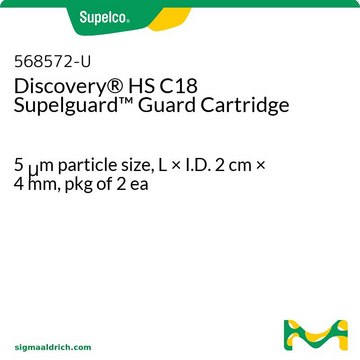568502-U
Discovery® HS C18 (5 µm) HPLC Columns
L × I.D. 15 cm × 2.1 mm, HPLC Column
About This Item
Recommended Products
product name
Discovery® HS C18 HPLC Column, 5 μm particle size, L × I.D. 15 cm × 2.1 mm
material
stainless steel column
Quality Level
Agency
suitable for USP L1
product line
Discovery®
feature
endcapped
manufacturer/tradename
Discovery®
packaging
1 ea of
extent of labeling
20% Carbon loading
parameter
≤70 °C temp. range
400 bar pressure (5801 psi)
technique(s)
HPLC: suitable
LC/MS: suitable
L × I.D.
15 cm × 2.1 mm
surface area
300 m2/g
surface coverage
3.2 μmol/m2
impurities
<10 ppm metals
matrix
silica gel, high purity, spherical particle platform
fully porous particle
matrix active group
C18 (octadecyl) phase
particle size
5 μm
pore size
120 Å
operating pH range
2-8
application(s)
food and beverages
separation technique
reversed phase
Looking for similar products? Visit Product Comparison Guide
Related Categories
Features and Benefits
- Stable, low bleed for LC-MS applications
- Scalable from analytical to preparatory
- Highly stable to ensure excellent run-to-run and lot-to-lot reproducibility
- Higher hydrophobicity for better resolution of difficult analytes
Legal Information
Choose from one of the most recent versions:
Already Own This Product?
Find documentation for the products that you have recently purchased in the Document Library.
Articles
The field of proteomics is continually looking for new ways to investigate protein dynamics within complex biological samples. Recently, many researchers have begun to use RNA interference (RNAi) as a method of manipulating protein levels within their samples, but the ability to accurately determine these protein amounts remains a challenge. Fortunately, over the past decade, the field of proteomics has witnessed significant advances in the area of mass spectrometry. These advances, both in instrumentation and methodology, are providing researchers with sensitive assays for both identification and quantification of proteins within complex samples. This discussion will highlight some of these methodologies, namely the use of Multiple Reaction Monitoring (MRM) and Protein-AQUA.
Our team of scientists has experience in all areas of research including Life Science, Material Science, Chemical Synthesis, Chromatography, Analytical and many others.
Contact Technical Service




